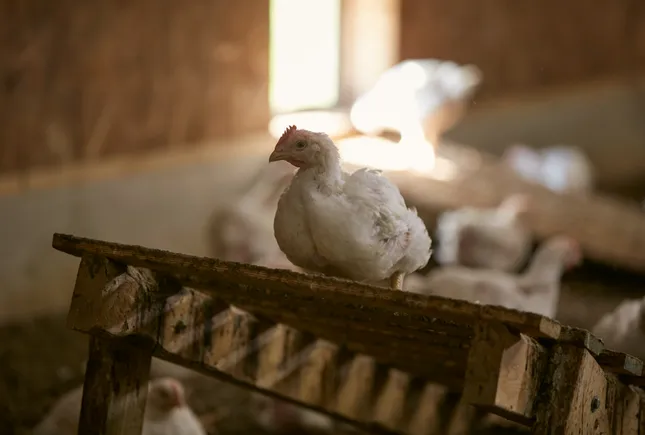Why Perdue Farms isn’t giving up on ‘no antibiotics ever’ chicken

After Tyson Foods said it would reintroduce some antibiotics in its chicken supply last summer, Perdue Farms is now the only of the four largest processors dedicated to “no antibiotics ever” production. And the poultry giant doesn’t plan on reversing course.
“We worked hard to get successful and raise chickens the right way,” Bruce Stewart-Brown, Perdue senior vice president of technical services and innovation, told Agriculture Dive in an interview. “And it has taken us to a position on animal welfare and animal care that we’re pretty proud of.”
Perdue remains a standout in the chicken industry as the sector is poised to move backwards on the issue. Although antibiotic sales for chicken declined for 2022, that trend could change after Tyson — the largest producer in the U.S. — walked back some of its antibiotic-free pledges last year. The move has already had ripple effects across food supply chains, with Chick-fil-A dropping its pledge to only serve antibiotic-free chicken in March due to sourcing concerns.
The agriculture industry has traditionally relied on antibiotics as a low-cost method to boost animal growth and control disease for livestock raised in sometimes crowded and unsanitary spaces. However, an overuse of antibiotics in animals has been found to raise the risk of antibacterial resistance in people, making human medications less effective.
“Wasting a cornerstone of modern medicine to compensate for poor animal husbandry, for the sake of slightly cheaper chicken is foolish,” Andre Delattre, chief operating officer of environmental and consumer advocacy organization Public Interest Research Group, told Agriculture Dive in an email. “Perdue deserves credit for sticking with its NAE commitment as others are backing away.”
Taking antibiotics out of production is expensive and sometimes difficult work, Stewart-Brown said, requiring that farmers constantly ensure their flocks are in pristine environments to prevent any potential contamination. Perdue began its journey toward antibiotic-free production in 2002, well over a decade before competitors like Tyson and Pilgrim’s Pride unveiled their pledges to reduce use of the drugs.
At the time, Perdue was responding to animal welfare complaints from consumers, with concerns mounting that meat producers were indiscriminately throwing antibiotics into feed in order to keep animals alive despite crowded and often unsanitary conditions. Over the course of 12 years, Perdue phased out drugs important to human medicines, first in animal feed in 2007 and then in hatcheries in 2014.
“We went through the process the right way, taking it a little bit at a time to really think through all aspects of raising chickens,” Stewart-Brown said.
In 2016, the company went even further, saying it would end use of animal-only antibiotics, including ionophores, which are commonly used to control the common parasitic intestinal disease coccidiosis in poultry. Instead of antibiotics, Perdue relies on natural supplements, such as oregano and thyme, to promote gut health in chickens.
As Perdue began to remove antibiotics from its production process, not all of its farmers were on board. Some growers left because of the additional steps needed to ensure operations are “super clean,” Stewart-Brown said.
“It did change the farmer’s perspective on how tough their job was,” Stewart-Brown said. “Some of them were unhappy and decided they’d rather raise chickens for another company, which we thought was probably a good idea.”
However, the move toward antibiotic-free production also attracted new growers who were more aligned with Perdue’s goals. Now, Perdue only uses antibiotics to treat chickens when they fall ill, which occurs around 5% a year on average. Chickens treated with antibiotics are removed from the no antibiotics ever program and sold through other channels.
The transition away from antibiotics hasn’t had a major impact on disease spread within Perdue’s flocks, with the percentage of chickens treated with medications trending down over the years. It’s also brought environmental benefits, preventing antibiotics from entering and contaminating groundwater.
The combination of environmental, animal welfare and public health benefits from removing medicines in animal production continues to drive Perdue’s no antibiotics ever commitment.
“All that cleaning, it’s not just about no antibiotics ever. It’s about better health for animals, humans and the environment,” Stewart-Brown said. “There’s all kinds of good things that come from that so we can’t back down.”
Source: fooddive.com

